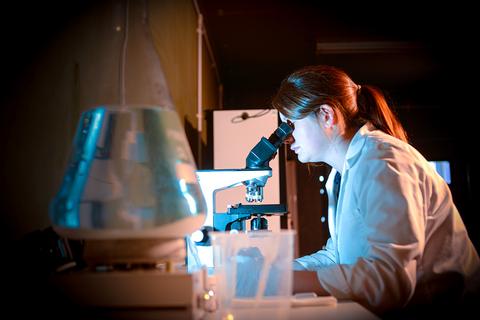Leanne Sterenberg


I am a... senior animal research technician
You could be an Animal Research Technician if you would enjoy:
- Working with animals in a scientific setting
- Collecting and processing data and biological samples from animals
- Planning, organising and carrying out practical tasks
- Monitoring animal welfare
A love for animals and an interest in science led Harper Adams graduate Leanne Sterenberg to a varied, interesting and rewarding role within the animal research industry.
Leanne Sterenberg is a Senior Research Technician with ADAS, the UK’s largest independent provider of environmental solutions, rural development services and policy advice. She graduated in 2011 with BSc (Hons) Animal Behaviour and Welfare.
Leanne is part of a team that carries out scientific studies to help develop farm animal health and feed additive products. She is responsible for collecting and processing data and biological samples from farm animal species including cattle, sheep, pigs, poultry and horses. It’s a role for which she feels her course and placement experience equipped her well.
“My degree provided me with knowledge of animal health and welfare, which is highly relevant to the work we do. Not being from an agricultural background, the course was sometimes challenging, as I was often studying and working with species that I’d not had previous experience with, but I certainly enjoyed this. It also helped improve my interpersonal skills immensely. I quickly adapted to being in situations where I was working with new people, and I gained the confidence to be far more comfortable with getting up in front of a group and presenting and discussing ideas, which are vital qualities in the work place.”
Leanne spent her placement year as an Animal Technician with the Animal Health and Veterinary Laboratories Agency, where she was involved in the daily husbandry and care of the livestock involved in scientific research projects. The 25-year-old says:
“The job was incredibly useful for providing me with experience working with livestock and working in a research environment. I became familiar with the legal aspects of animal research and biosecurity procedures. Liaising with scientific staff during procedures was always interesting and gave me an insight into their job role, which encouraged me to pursue a career in that field myself.
“Placement definitely helped enhance my career prospects. I think work experience is as important as academic performance – especially in a highly practical field such as working with animals – and a year in a workplace allows you to acquire valuable skills which will make settling into a graduate job easier.”
Leanne now enjoys a varied and challenging job with ADAS:
“A typical day for me can involve working with animal care technicians, carrying out study-specific procedures with a range of livestock species. This may include data collection e.g. animal weights, feed intakes, and/or collection and processing of samples, on farm and in the lab.
“I may be involved in making decisions alongside technicians, regarding the health and welfare of animals on studies, i.e. whether extra checks may be necessary, or if veterinary attention is needed, to help maintain a high level of care of the animals.
“There is quite a lot of checking of animal husbandry records and raw data, data input, and management of study-specific records. I am also responsible for the maintenance and calibration of specific equipment on site, and provision of consumables and forms required for studies and procedures that I am assigned to.”
She adds:
“I like the amount of variety my job has, most days are different and a lot of studies require us to learn new skills and techniques and work within strict time frames.
“If I were to offer advice to any students considering their future career I would say keep an open mind and try different things – you might find that what you really enjoy isn’t what you set out to do in the first place. And if you find you don’t like something after all, it’s not the end of the world – now’s the time to figure that out. Besides that, prepare to be challenged, be determined, ask lots of questions and never be afraid to put yourself forward and get involved!”
You may also be interested in these stories:
More about animal research jobs: www.adas.co.uk
Leanne on Harper Adams
Why did you choose to study at Harper Adams?
I made the decision to study at Harper Adams primarily because the course was what I was looking for in terms of content. When I visited the campus I liked the location and that it was quite small and that everything was in one place. There was a friendly atmosphere and a good sense of community – I got the feeling I would settle in easily.
What’s the teaching like?
It’s great, because lecturers always had time for one to one support if needed. I always felt that if I was struggling, I could go and talk to them and get the help I needed.
What about the facilities?
Really good; the library provided access to all the relevant literature I needed for my studies. The farm and companion animal unit were ideal for practical experience and for use on research projects.
What are your favourite memories?
I have so many brilliant memories of fun, messy and downright mad times with the fantastic friends I made there! But generally, Wednesday nights in the SU bar, Course Socials and Balls were guaranteed to be a good time!
Would you recommend it to other students?
Yes - I had an amazing time there. Studying at Harper Adams didn’t just further me academically and improve my professional skills, but during my time there I gained independence, acquired valuable life skills and met my best friends.
How did your qualification/ experiences at Harper Adams aid your career?
My degree provided me with knowledge of animal health and welfare which is highly relevant to the work we do. My placement year gave me skills, experience and qualifications that could easily be transferred to ADAS, which I think strengthened my application and made it easier for me to fit into my job role.




